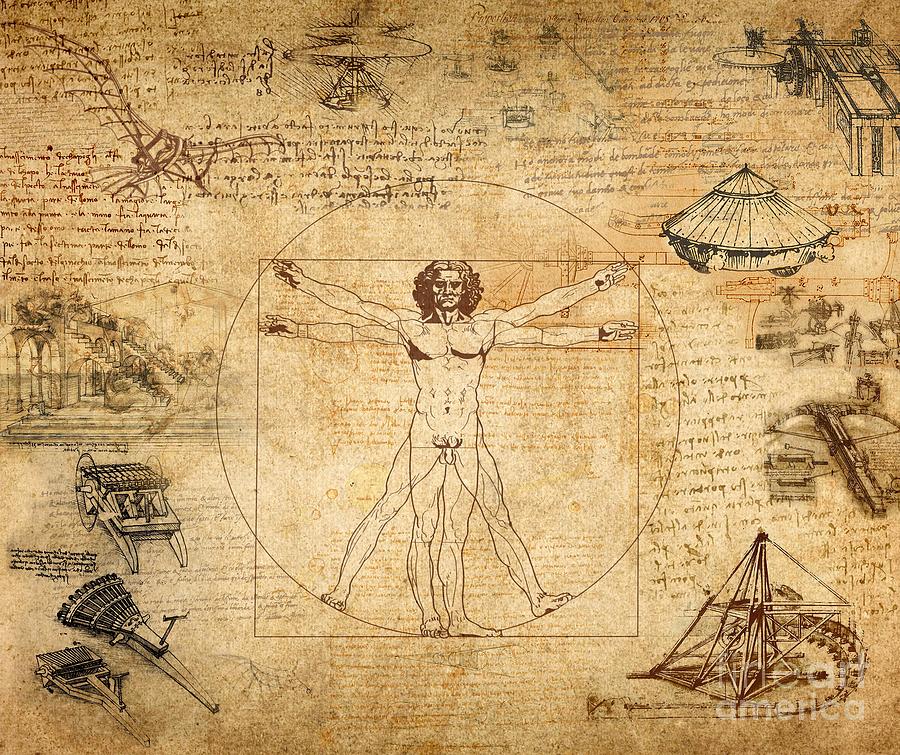It was late April 1519. After months of illness Leonardo da Vinci, the illegitimate son who had accomplished the impossible in his life, had begun to feel that his death was only a few days away. At this decisive moment when the sunshine had begun to retreat into the abyss he was not, unlike any other mortals, tormented by the terror of the unknown, instead his thoughts and soul kept returning to the contemplation of that force, both enigmatic and sublime, which had made him the genius he had become during the limited period granted on this planet.
Leonardo lay in his deathbed, his chiseled chin buried in the labyrinth of his sage-like beard. Disenchanted by the politics of his home country Italy he had been living in the palace of the French King, his old friend, who admired him as the embodiment of the Italian Renaissance. Next to the bed, one can imagine the legendary Monalisa, though incomplete, standing serenely with her mysterious smile. What this unfinished Monalisa was to unleash upon the art world years later was the least of the maestro’s concern.
As he lay dying, several of his friends, including the king, visited him. They noticed that he was in a pensive mood. Though never a man who liked to talk about his life, at this moment he allowed himself the liberty to share with his friends about the strange, improbable occurrences which had determined the direction of his life.
War for the Planet of the Apes

Leonardo had unshakeable faith in the force of destiny. In fact, for years he had been haunted by one specific question: Is there a power of some kind from within that makes all living things grow and transform themselves? At this final moment he felt the question hold sway all through him with flaming intensity. Which is the reason why after his friends left him alone, his reflection penetrated deeper and wore an almost magical aura. He let his old mind wander through meandering routes of Florence where he had roamed as a kid. It floated across that musical brook where he had first mastered the art of taming the energy of water current. Then his mind cut through the dense forest that framed Florence to the west, and found itself examining the creatures that bustled in the undisturbed world there.
On the cusp of death, he felt all his senile strength converge towards untangling the mystery of his own life. As he did so a gushing ray of recognition dawned on him. He realized that had he not been an illegitimate child, his life would have taken a completely different course. Being illegitimate allowed him the freedom to wander through the world with cub-like independence. Not swamped by societal demands to abide by its rules, he experienced the world with the innocent purity of an untamed child. He picked the pen not because he was condemned by anyone to write, but because he, fascinated as he was by the myriad lives he observed in the forest, found it a necessity to record nature on a piece of paper. The freedom this illegitimacy granted him became the testament to his genius.
What he accomplished through his unrestrained independence reaches us in the whisperous echo from the dusky, partially-forgotten corridors of the Renaissance. It has become a canonized legend of the art world that when he painted one of angels of the Baptist of Christ, his art mentor Verrocchio, was so deeply stunned by its mesmerizing perfection that he never painted again after this miracle. Leonardo was merely twenty-two at the time. There are numerous anecdotes of this kind associated with him. So what did Leonardo uncover about himself as he lay dying in that April of 1519?
As death tightened its grip further on him and the rosy dusk of life began to veer into an eternal darkness, his soul was finally comforted by the powerful illumination of self-knowledge. He realized that his childhood freedom allowed his inner voice to thrive naturally. There was no societal pressure to nip his voice in the bud. In fact, we all are naturally endowed with certain gifts. We are, after all, the aching yearning of this universe that wants to express herself through our soul. We all are unique. And never again, never, never, another one like us will walk this planet and never again a soul, with depth and intensity like us, will feel the warm dazzle of the moon the way we feel. This is reality, and the universe, better than any of us, knows it. For this reason, we all carry an imprint, a flaming longing so to speak, which can sing the glory of the universe through our unique presence.
We have descended from the family of apes. Our forefathers lived on trees and their necessity to move swiftly led to the evolution of our fingers. Slowly they started to dwell on ground, make weapons, the little huts and machinery. This all can be attributed to that same voice of the universe that longs to be expressed through life and human longing. The need to make weapons and socialize allowed our species to experience things by merely watching someone do it and thereby learn it. In a recent experiment it was shown that certain neurons of apes, called mirror neurons, fire in the same manner when it is watching another ape climb a tree to the situation when it itself is climbing a tree. Slowly, this ape-like ability of our forefathers’ mirror neurons led to the evolution of human consciousness.
As descendents of our forefathers, we all embody an ability to consciously allow our inmost voice to assert itself freely. Of course, the innumerable noises outside impede this development, but as a human, the way Leonardo’s life has shown, we inhabit abilities to make our lives count and, naturally, we deserve moments of happy contemplation, like Leonardo, while lying in our death bed.
@@@






































